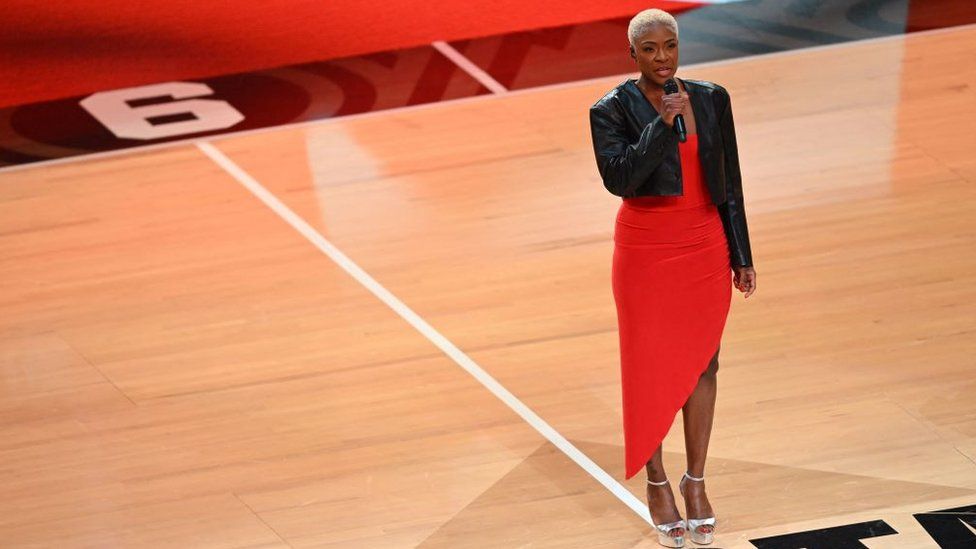ARTICLE AD BOX
 Image source, Getty Images
Image source, Getty Images
By Holly Honderich & Eloise Alanna
BBC News
When Canadian singer Jully Black walked on court to sing her country's national anthem at an NBA all-star game on Sunday, she was more nervous than she'd ever been. "I had a secret," she said.
Performing live to a packed Salt Lake City stadium, she was about to alter the song's lyrics: "our home and native land" to "our home on native land".
The one-word shift, a nod to indigenous rights, generated plenty of attention.
And some say the change to the century-old anthem should be permanent.
Ms Black, who was born and raised in Toronto, said she quit singing the national anthem, O Canada, a few years ago after a number of indigenous communities in Canada said they had found evidence of unmarked graves on the grounds of former residential schools.
Some 150,000 indigenous children were taken from their families and placed in these government-funded boarding schools in the 19th and 20th Centuries, and at least 3,200 are believed to have died there.
"That really woke everything up," Ms Black told the BBC.
But when she was asked to sing the anthem at the basketball game, Ms Black thought it was time to take a closer look at the words she had been singing since she was a child. When she did, the change was obvious, she said.
"Our home and native land is a lie," Ms Black said. "Our home on native land is the truth."
Canada has a history of domination and assimilation of indigenous people in the country.
In recent years, spurred by indigenous communities seeking unmarked graves and burial sites at former residential schools, calls for reconciliation - repairing the relationship between indigenous people and non-indigenous people and government - have been growing.
But the lyrical change has drawn broad praise, including among indigenous people who have applauded the show of solidarity.
"What Jully Black did was she shared her power and her opportunity to give us attention," said Niigaan Sinclair, a professor of native studies at the University of Manitoba, who is Anishinaabe. "It should be a model for every Canadian."
"Fundamentally, the national anthem - like the flag, like our laws and policies - has been used to oppress us as indigenous people, and the more that we can challenge that, the better," he said.
But Mr Sinclair was quick to emphasise that any change to the anthem matters less than improving the quality of life of indigenous people in Canada.
"Canadians should be caring far more about the oppression and violence that indigenous people experience every day than changing one word in a song," he said.
Since the game on Sunday, some have been critical of the lyrical change.
"Canada is the 'native land' to anyone born in Canada, regardless of when they were born," wrote Lorrie Goldstein, a Toronto Sun newspaper columnist on Twitter. "Given the point she wanted to make, 'our home on Indigenous land' would be more accurate, but that doesn't scan."
For her part, Ms Black said she welcomed the feedback. "Even for those who might have something negative to say about it… it's still conversation happening, so it's a win no matter what," she said.
The century-old anthem has been changed once before, in 2018, when its lyrics were altered to make them gender-neutral, changing "all thy sons command" to "all of us command".
"O Canada now includes all of us," the Senate said at the time.
And now, some are hoping Ms Black's unofficial alteration becomes permanent. At the very least, the change is permanent to her.
"I can't sing the anthem the other way anymore," she said.

 2 years ago
46
2 years ago
46








 English (US) ·
English (US) ·